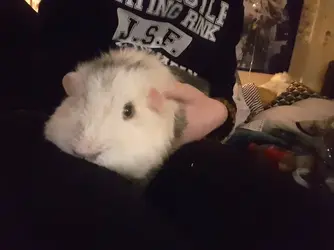Don't talk to him while he's chattering his teeth as that'll make things worse and he'll associate your voice with whatever is currently aggroing him. Talk only when he stops clattering his teeth. Also, PAY attention to WHEN he chatters his teeth. Some will chatter when touching their nose, then immediately stop when you stop touching, then start again instantly after touching again. So in that case, nose touching would be avoided until he's used to you and you can desensitize the behavior.
Since you didn't get him as a pup at day 1, his background could have been filled with neglect and/or abuse. Adopting a gp is like fostering a child, you have zero background on where they've been or what they were exposed to, so what you'll actually experience now will rely heavily on your ability to pay attention to what it'll tolerate or won't tolerate.
My advice is find a veggie it LOVES. Most seem to love lettuce, and as long as you aren't overfeeding it, it shouldn't get the runs. Put a bunch of lettuce scraps in a bowl (or whatever it eventually LOVES to eat) and then put the bowl off to the side. With it on your lap (this is assuming it'll even eat from your hand yet, need to work up this if not) chest, etc., wait until it stops chattering, then give a small piece of lettuce (do NOT say anything, just give it a piece). Try petting it's nose while it's eating the lettuce/veggie reward. The idea is to get it to associate the no teeth chatter/nose touch with lettuce. Try this for a couple minutes, then put it back. If it's not chattering/biting a finger while walking it back to the cage, you can say something like "want to go back to your cage" as you put it back. If IT tries jumping from your hand, hold other hand in front of it's face, similar to how horse blinder works. Once it's paws are on the bedding, remove the hand. That will stop it from jumping.
Do this as a routine, several times a day, for a couple months or until it learns. It'll eventually understand what "going back to the cage" means (which should be viewed as an actual reward to the guinea pig as it actually wants to go back), and once it stops chattering while being held/given veggies, THEN you can talk to it so long as it doesn't start chattering again in mid sentence.
Simply put, reward the good behavior, and avoid the bad behavior. Avoid talking when the bad behavior is present as it WILL associate words with whatever is happening. A prime example of this is my boar Scottie, when he was younger and getting intro'd to a sow I own via through the bars contact, I'd always say "do you want to go see her?" then take him over to her cage. To this day, if I say that now (he's 9-10 months old I think) he'll immediately start rumbling whether he's in his cage or being held, and will get super excited and start squeaking followed by bouts of more rumbling. This was actually by accident, I was just talking to him while an action HE wanted was occurring, and it stuck. If anyone doubts it, I can upload a video of him doing it after I say the magic words. I also use teeth chatter as a discouraging event if a couple sows are being brats to each other for the sake of being brats. They've learned when I chatter my teeth, I'm not happy with the action, and will usually stop and abandon their minor squabble. So it definitely can go both ways (good vs. unwanted behavior). Think of your gp as a special needs child needing a different tool set to cope.
